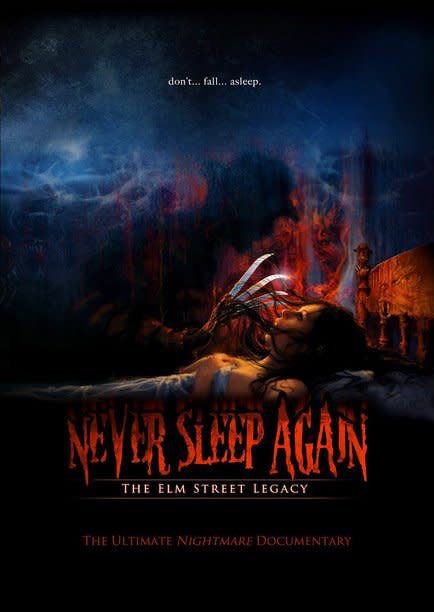'Elm Street' documentary: Wes Craven speaks

It has been very quiet on the A Nightmare on Elm Street front since the Jackie Earle Haley-starring reboot of Wes Craven’s original horror classic hit cinemas in 2010. But horror fans with both a desire to know more about the franchise and a Blu-ray player should definitely check out the exhaustive documentary Never Sleep Again: The Elm Street Legacy, which debuts on that format tomorrow. Directed by Daniel Farrands and Andrew Kasch and penned by Thommy Hutson (writer of the forthcoming horror movie Animal) the four-hour film finds Craven, Robert Englund, Heather Langenkamp, and many many more reminiscing about the trials and tribulations involved in bringing Freddy Krueger to the screen over the years.
Below, Craven himself talks about Never Sleep Again, the lasting impact of Freddy, and why your writer is better placed than him to know when we will see ol’ pizza face on the big screen again.
ENTERTAINMENT WEEKLY: You came up with the character of Freddy Krueger. What is it like having your creation become the subject of a four-hour documentary?
It’s a compliment. That and Scream, I think, are the only two things [I’ve done] that have become part of the global culture. A Nightmare on Elm Street allusion just turned up on Jon Stewart about two weeks ago. He was talking about “Nightmare on Wall Street” and all the letters were in the Nightmare on Elm Street font. I was watching National Geographic just three nights ago and there was a thing on the African lion being the perfect killing machine and they were talking about the claws being something that would intimidate Freddy Krueger. And I just sat there and was thinking, It’s amazing how deeply into the culture that film has penetrated.
While watching the documentary did you learn anything you didn’t know about the series?
I wrote the book, in a sense. But I did learn things about the making of the other films and some things about the actors’ lives and the effect that it’s had on some people.
I was almost more interested in the parts of the documentary which dealt with the films you didn’t direct. It’s fascinating to see people trying to riff a blueprint without the original architect being present, as it were.
Yeah, I imagine that was tricky. I think some of the directors did really really good jobs. I know there was a big pressure to have one come out every year. So that’s always kind of a recipe for semi-disaster. It’s just a little bit too short of a time to have somebody get inspired with some genius idea and get that written and get that shot and edited and out in the theatres. I’ve been under that gun [like that] several times and it’s very difficult.
It’s also very interesting to watch you and New Line chief Bob Shaye be extremely polite in the film while recalling the times that maybe you weren’t so polite with each other.
You know, it was always polite. Even when Bob and I differed — for instance on the ending of the film — it was always from a standpoint of two guys that were making the film together. My reservations about some of the things about Bob and I had to do with the way the overall deal was made. You know, he just profited from it immensely more than I did. But, ten years later he did come to me and make some amends and I’ve always said in interviews that if it were not for Bob Shaye then that film would not have been made at all. I can’t remember ever us having any kind of a shouting match or anything like that. Anyway, that’s old stuff. I hold nothing against Bob.
Bringing us up to the present — or rather the future — when will we see Freddy Krueger on the screen again?
Well, the deal is that New Line was bought by Warner Bros. They pretty much own that outright and it would be whatever they decide to do with it. Obviously they made a remake of it. But I was never consulted and I never went to see it. I can’t imagine a situation where I would be involved with it again. As I say, I don’t own it. I don’t even know the people who do.
Maybe you should be asking me given that Entertainment Weekly is part of the same corporate structure as Warner Bros.
Oh yeah? Do you know?
No.
[Laughs] You don’t sit in on the board meetings?
I do not.
I could make a call there. But they’d say, “Wes who?”
